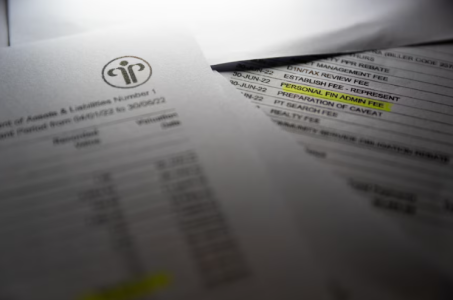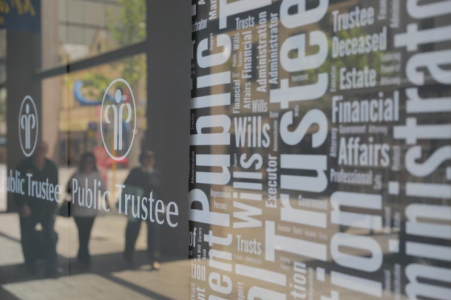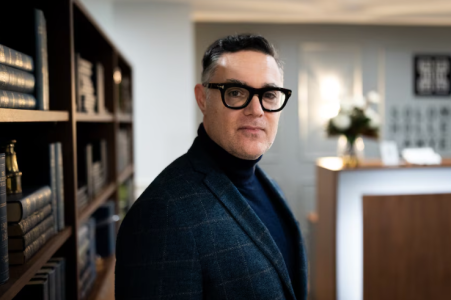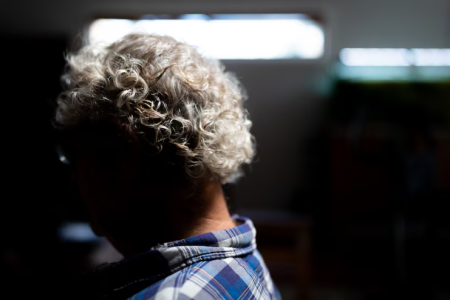WA Public Trustee office charges woman with dementia $137,000 to manage assets at a loss
By
ABC News
- Replies 0
An "overworked and under-resourced" state agency has charged a woman with dementia a six-figure bill while managing her assets at a loss.
Public trustees control the finances of some of the community's most vulnerable people who have been deemed incapable of making their own decisions, for example if a person has a cognitive impairment from a head injury.
It's illegal to identify people across most of Australia who are, or were, under state administration or guardianship.
Daniel, not his real name, said he regrets ignoring warnings from lawyers to avoid the WA Public Trustee's office.
"We enquired to a barrister ... she recommended not to go through public trustees," Daniel told the ABC.
"She warned us, that is the last thing you want to do."
Daniel's mother had dementia, and was put into state administration under the Public Trustee during a family dispute.
Over eight years, the state charged her $137,000 in fees for managing her finances and assets, including three properties in Perth.
"For one of the properties, I managed, and they still charged us for it ... I can't see how they can be justified in charging for something they never even did," Daniel said.
'Totally mismanaged'
Financial statements, seen by the ABC, show the Public Trustee spent about $24,000 of Daniel's mother's money to repair one of the properties and replace an oven.
The trustee's office then ran two of the houses as rental properties at a loss for several years.
The most profitable year was straight after the renovations — the repaired three-bedroom house in Perth took in $17,114 in rent over a year which averages out to $329 per week.
The average rent in the area that year was $461 per week according to the local council.
Two years later, the same property brought in an annual total of $6,619 in rent, which fell thousands of dollars short of covering bills, and property and land taxes.
"It's disgusting how a property in [Perth] can lose so much money," Daniel said.
"Just totally mismanaged ... I can't understand how they can get away with all this."
"They [mum and dad] worked their whole lives for all this — and it wasn't only their lives, we as a family worked together to build up these assets — and they [the Public Trustee's office] ran them at a loss."
Several organisations which help people under state administration in WA have told the ABC they can't speak publicly about concerns they have with the system, out of fear of jeopardising their relationship with the Public Trustee and putting future cases at risk.
The organisations include community legal centres and advocacy organisations which receive government funding.
Self-funded trustees
Public trustees are mostly self-funded by charging some clients more to subsidise others that can't afford to pay — in Western Australia and Queensland, the trustees are completely self-funded.
The state is assigned as an administrator of "last resort" to manage a person's money and assets in their best interest, for a fee.
The WA Public Trustee manages $1.7 billion worth of assets, as of its latest annual report.
In response to written questions to the WA Public Trustee, a Department of Justice spokesperson said the agency was bound by confidentiality provisions, and did not directly answer questions about Daniel's mother's case, or concerns over organisations' fears of speaking publicly.
"The Public Trustee charges fees in accordance with its Scale of Fees which is reviewed annually ... subject to scrutiny by the Joint Standing Committee on Delegated Legislation," the statement read.
"Any person dissatisfied with the way in which the Public Trustee has dealt with their complaint has several avenues for investigating their concerns, including lodging a complaint with the Ombudsman or the State Administrative Tribunal."
'Overworked and under-resourced'
Succession lawyer Morgan Solomon works in the same field of law which falls under part of public trustees' remits, and says it's "no secret" the government agencies are stretched thin.
"Dealing with the affairs of someone after they've passed away is inherently complicated work — it's the unravelling of essentially a life's worth of materials," he said.
"The Public Trustee is overworked and under-resourced."
"The amount of work that ... staff there have to do is extraordinary, their caseload I think is in many cases unmanageable ... they do what they can with what they have."
Mr Solomon urged the public to consider having wills prepared, and also enduring powers of attorney and guardianship.
"A will comes into being only when you pass away, but there are other catastrophes that can befall us, which is the loss of mental capacity which can affect anyone," he said.
"We just did a survey of a thousand Western Australians ... 60 per cent of families in WA are anticipating some kind of inheritance dispute, which floored us."
WA Public Trustee set for public scrutiny
Daniel said he believed there was a need for the state to manage the finances of some vulnerable people as a last resort, but said there should be more transparency.
"They don't look after the people that really need it," Daniel said.
"I reckon you definitely need a group like the public trustees ... but I think they should be held more accountable."
There have been numerous accounts of state trustees and guardians around the country providing questionable care, and allegations of exorbitant fees for little work.
In 2023, the WA Government committed to implementing an independent governing board to improve oversight of the Public Trustee, and the development of a more "transparent and equitable" fee model.
The WA Law Reform Comission is also reviewing the state's guardianship and administration legislation.
A WA parliamentary committee will be questioning the Public Trustee this week.
Written by Cason Ho, ABC News.
Public trustees control the finances of some of the community's most vulnerable people who have been deemed incapable of making their own decisions, for example if a person has a cognitive impairment from a head injury.
It's illegal to identify people across most of Australia who are, or were, under state administration or guardianship.
Daniel, not his real name, said he regrets ignoring warnings from lawyers to avoid the WA Public Trustee's office.
"We enquired to a barrister ... she recommended not to go through public trustees," Daniel told the ABC.
"She warned us, that is the last thing you want to do."
Daniel's mother had dementia, and was put into state administration under the Public Trustee during a family dispute.
Over eight years, the state charged her $137,000 in fees for managing her finances and assets, including three properties in Perth.
"For one of the properties, I managed, and they still charged us for it ... I can't see how they can be justified in charging for something they never even did," Daniel said.
'Totally mismanaged'
Financial statements, seen by the ABC, show the Public Trustee spent about $24,000 of Daniel's mother's money to repair one of the properties and replace an oven.
The trustee's office then ran two of the houses as rental properties at a loss for several years.
The most profitable year was straight after the renovations — the repaired three-bedroom house in Perth took in $17,114 in rent over a year which averages out to $329 per week.
The average rent in the area that year was $461 per week according to the local council.
Two years later, the same property brought in an annual total of $6,619 in rent, which fell thousands of dollars short of covering bills, and property and land taxes.
"It's disgusting how a property in [Perth] can lose so much money," Daniel said.
"Just totally mismanaged ... I can't understand how they can get away with all this."
"They [mum and dad] worked their whole lives for all this — and it wasn't only their lives, we as a family worked together to build up these assets — and they [the Public Trustee's office] ran them at a loss."
Several organisations which help people under state administration in WA have told the ABC they can't speak publicly about concerns they have with the system, out of fear of jeopardising their relationship with the Public Trustee and putting future cases at risk.
The organisations include community legal centres and advocacy organisations which receive government funding.
Self-funded trustees
Public trustees are mostly self-funded by charging some clients more to subsidise others that can't afford to pay — in Western Australia and Queensland, the trustees are completely self-funded.
The state is assigned as an administrator of "last resort" to manage a person's money and assets in their best interest, for a fee.
The WA Public Trustee manages $1.7 billion worth of assets, as of its latest annual report.
In response to written questions to the WA Public Trustee, a Department of Justice spokesperson said the agency was bound by confidentiality provisions, and did not directly answer questions about Daniel's mother's case, or concerns over organisations' fears of speaking publicly.
"The Public Trustee charges fees in accordance with its Scale of Fees which is reviewed annually ... subject to scrutiny by the Joint Standing Committee on Delegated Legislation," the statement read.
"Any person dissatisfied with the way in which the Public Trustee has dealt with their complaint has several avenues for investigating their concerns, including lodging a complaint with the Ombudsman or the State Administrative Tribunal."
'Overworked and under-resourced'
Succession lawyer Morgan Solomon works in the same field of law which falls under part of public trustees' remits, and says it's "no secret" the government agencies are stretched thin.
"Dealing with the affairs of someone after they've passed away is inherently complicated work — it's the unravelling of essentially a life's worth of materials," he said.
"The Public Trustee is overworked and under-resourced."
"The amount of work that ... staff there have to do is extraordinary, their caseload I think is in many cases unmanageable ... they do what they can with what they have."
Mr Solomon urged the public to consider having wills prepared, and also enduring powers of attorney and guardianship.
"A will comes into being only when you pass away, but there are other catastrophes that can befall us, which is the loss of mental capacity which can affect anyone," he said.
"We just did a survey of a thousand Western Australians ... 60 per cent of families in WA are anticipating some kind of inheritance dispute, which floored us."
Daniel said he believed there was a need for the state to manage the finances of some vulnerable people as a last resort, but said there should be more transparency.
"They don't look after the people that really need it," Daniel said.
"I reckon you definitely need a group like the public trustees ... but I think they should be held more accountable."
There have been numerous accounts of state trustees and guardians around the country providing questionable care, and allegations of exorbitant fees for little work.
In 2023, the WA Government committed to implementing an independent governing board to improve oversight of the Public Trustee, and the development of a more "transparent and equitable" fee model.
The WA Law Reform Comission is also reviewing the state's guardianship and administration legislation.
A WA parliamentary committee will be questioning the Public Trustee this week.
Written by Cason Ho, ABC News.













